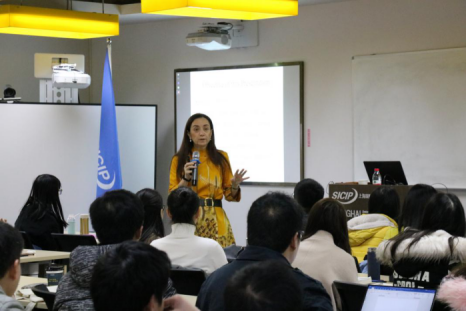

From November 27th to December 1st, 2017,Irene Calboli,Professor of Singapore Management University School of Law,gave lively courses to students from Shanghai International College of Intellectual property(SICIP) on the topic of international protection for trademark(TM) and geographical indications(GIs). The lectures started with introduction of corresponding International treaties on the legal protection for TM and Gls, including Paris convention, Madrid Agreement, Lisbon Agreement and TRIPS Agreement, and by comparing cases of diverse countries and regions, followed with analysis of the difference of TM and Gls protection among European Union, the United States and some Southeast Asian countries.
TM and Gls are very significant parts of intellectual property.TM has three general functions: indicating commercial origin, guaranteeing product quality and advertising. So it is worth defending. In this part, Prof. Calboli mainly introduced subject matter, conditions for registration, special protection and defends under Paris Convention and TRIPS Agreement. As for theGls, they not only play a fundamental role as source identifiers by informing consumers about the geographical origin of the goods, but also serve as indicators of the commercial quality and reputation of the goods. She also asked Chinese and international students to print pictures of some special products in their own counties and everyone made a display and brief introduction in class, which made classroom atmosphere more active and promoted cultural exchange. Finally, Prof. Calboli looked forward to the future of international protection for TM and Gls.
On December 2nd, Prof. Calboli gave a lecture in particular that is open for allthe students of the University. The topic is the impact of 3D printing on IP rights.She introduced the challenges brought by 3D printing technology in employment, environment and product quality in detail, but emphasized that it also provided an opportunity to enhance intellectual property protection at the same time. We should embrace it with an open mind.







 0086-021-65983113
0086-021-65983113  sicip_intoff@tongji.edu.cn
sicip_intoff@tongji.edu.cn